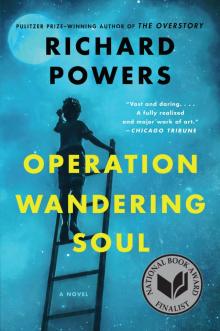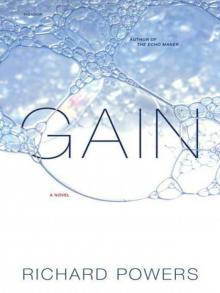- Home
- Richard Powers
Orfeo
Orfeo Read online
TABLE OF CONTENTS
Cover
Title Page
Orfeo
Acknowledgments
Copyright
Also by Richard Powers
ORFEO
An overture, then:
Lights blaze from an American Craftsman home in a demure neighborhood, late on a spring evening, in the tenth year of the altered world. Shadows dance against the curtains: a man working late, as he has every night that winter, in front of shelves filled with glassware. He’s clad in mufti, protective goggles, and latex hospital gloves, and his Giacometti body hunches forward as if in prayer. A gray but still-thick Beatles mop hangs in his eyes.
He studies a book on the gear-cluttered workbench. In one hand—a single-channel pipette, raked like a dagger. From a tiny refrigerated vial, he sucks up no more colorless liquid than a hoverfly might take from a sprig of bee balm. This pellet goes into a tube no bigger than a mouse’s muzzle, a dollop so small he can’t be sure it’s really there. His gloved hands shake as he shoots the used pipette tip into the trash.
More liquids go from the beakers into the dollhouse cocktail: oligo primers to start the magic; heat-stabilized catalyzing polymerase; nucleotides that fall in line like enlisted men for a five a.m. reveille, a thousand bonds per minute. The man follows the printed recipe like an amateur cook.
The brew goes into the thermal cycler for twenty-five rounds of roller-coaster flux, swinging between near-boiling and tepid. For two hours, DNA melts and anneals, snatches up free-floating nucleotides, and doubles each time through the loop. Twenty-five doublings turn a few hundred strands into more copies than there are people on Earth.
Outside, budding trees submit to the whims of a light wind. A wave of holdout nightjars skim the air for bugs. The do-it-yourself genetic engineer removes a colony of bacteria from his incubator and sets it under the laminar flow hood. He stirs the flattened culture flask and dispenses the loosened cells into a twenty-four-well sample plate. This plate goes under a microscope, at 400x. The man puts his eye up to the lens and sees the real world.
Next door, a family of four watches the denouement of Dancing with the Stars. One house to the south, an executive secretary for a semi-criminal real estate development firm arranges next fall’s cruise to Morocco. Across the double expanse of backyards, a market analyst and his pregnant lawyer wife lie in bed with their glowing tablets, playing offshore Texas hold ’em and tagging pictures from a virtual wedding. The house across the street is dark, its owners at an all-night faith-healing vigil in West Virginia.
No one thinks twice about the quiet, older bohemian in the American Craftsman at 806 South Linden. The man is retired, and people take up all kinds of hobbies in retirement. They visit the birthplaces of Civil War generals. They practice the euphonium. They learn tai chi or collect Petoskey stones or photograph rock formations in the shape of human faces.
But Peter Els wants only one thing before he dies: to break free of time and hear the future. He’s never wanted anything else. And late in the evening, in this perversely fine spring, wanting that seems at least as reasonable as wanting anything.
I did what they say I tried to do. Guilty as charged.
On the tape, the hum of deep space. Then a clear alto says: Pimpleia County Emergency Services, Dispatcher Twelve. What is the location of your emergency?
There comes a sound like a ratchet wrapped in a towel. A hard clap breaks into clatter: the phone hitting the floor. After a pause, a tenor, in the upper registers of stress, says: Operator?
Yes. What is the loc—
We need some medical help here.
The alto crescendos. What’s the nature of your problem?
The answer is a low, inhuman cry. The tenor murmurs, It’s okay, sweetie. It’s all right.
Is someone sick? the alto asks. Do you need an ambulance?
Another muffled bump turns into static. The silence ends in a stifled O. Rapid words shear off, unidentifiable even with digital filtering and enhancement. The sounds of failed comforting.
The dispatcher says, sir? Can you confirm your address?
Someone hums a muted tune, a lullaby from another planet. Then the line goes dead.
I was sure that no one would ever hear a note. This was my piece for an empty hall.
The two officers who pulled up in front of 806 South Linden in an indigo squad car had already dealt that evening with an antidepressant overdose, a molar-breaking scrum in a convenience store, and a eugenics debate involving small arms fire. Life in a Pennsylvania college town flexing itself, and the night was still young.
The house belonged to Peter Clement Els, an adjunct professor who’d been released from Verrata College three years before. The police database had nothing; it seemed Mr. Els had never even jaywalked. The two officers—a young man with a shot-putter’s gait and an older woman who gazed around bewildered as she walked—headed up the path to the front steps. Maple branches clicked in the spring wind. Dampened hilarity spilled out of a nearby house and across two dark lawns. High overhead, the twin jets of a short-haul flight shrieked toward the regional airport. Cars scythed up and down the state highway four blocks away.
The front porch was littered with things on the verge of being put away: a wood chipper, a pair of chewed-over rawhide bones, nested flowerpots, a bicycle pump. The male officer held open the screen, and the woman knocked, braced for anything.
Something flickered behind a half-moon window, and the door swung open. A gaunt, monkish man stood in the wedge of light. He wore rimless glasses and a plaid work shirt pilled around the collar. His gray hair looked as if a pioneer woman had cut it using an inverted bowl. An archipelago of food stains speckled his corduroys. His eyes were way elsewhere.
Mild disarray ruled the room behind him. Mission chairs sat ringed by bookshelves. Books, CD jewel cases, and stalagmite-coated candles covered every surface. A corner of the worn Persian rug was flipped up. The evening’s dinner dishes sat stacked on a magazine-covered coffee table.
The woman officer surveyed the scene. Peter Els? You placed a call to Emergency Services?
Els closed his eyes, then opened them. My dog just died.
Your dog?
Fidelio.
You dialed 911 for your dog?
Beautiful golden retriever. Fourteen years old. She started hemorrhaging out of the blue.
Your dog was sick, the policeman said, her voice sagging under the weight of humanity, and you didn’t dial a vet?
The guilty party dropped his eyes. I’m sorry. A stroke, I guess. She was sliding around on the floor and howling. She bit me when I tried to move her. I thought that if someone could help restrain . . .
Behind a gate, down a hallway leading from the living room, a green quilt covered a lump as big as a curled-up child. The male officer pointed. Peter Els turned to look. When he turned back, his face was an anagram for confusion.
She must have thought I was punishing her. He held the half-open door and studied the ceiling. I’m sorry to have bothered anyone. It felt like an emergency.
The officer nodded toward the lump. Can we have a look?
Els flinched. At what? She’s dead. After a clumsy pause, he stepped aside.
In Els’s living room, the uniforms looked harsher and more hardware-laden. The three walls of floor-to-ceiling shelves stuffed with books and CDs unnerved the male officer. He stepped over the gate and down the hall to the covered lump lying on the floor, where he turned back the sheet.
That dog trusted me, Els said.
Goldens are good dogs, the woman said.
That dog loved everybody. I’m surprised she lasted fourteen years.
The male officer pulled the quilt back over the corpse. He retreated down the hall and stepped back over the gate. He finge
red his belt: baton, handcuffs, communicator, keys, pepper spray, flashlight, gun. His brass name bar read Mark Powell. You’ll have to contact Animal Care and Control.
I thought I’d . . . Els thumbed toward the back of the house. Give her a decent burial. She loved it back there.
You have to call Animal Care and Control, sir. Reasons of public health. We can give you the number.
Ah! Peter Els raised his brows and nodded, as if all kinds of mysteries at last made sense. The woman gave him a number. She assured him that the law required the call and that nothing could be easier.
Officer Powell scanned the shelves of CDs: thousands of discs, the latest obsolete technology. A large wooden frame, like a freestanding coat rack, stood against one wall. Several sawn-off water-cooler bottles hung from the frame by bungee cords.
Powell touched his belt. Judas Priest!
Cloud chamber bowls, Els said.
Cloud chamber? Isn’t that some kind of . . . ?
It’s just a name, Els said. You play them.
You’re a musician?
I used to teach it. Composition.
A songwriter?
Peter Els cupped his elbows and bowed his head. It’s complicated.
What do you mean, ‘complicated’? Techno-folk? Psychobilly ska?
I don’t write much anymore.
Officer Powell looked up. Why not?
A lot of music in the world.
The communicator on the policeman’s belt hissed and a woman’s voice issued phantom instructions.
True, that. A lot of everything.
The officers swung back toward the front door. Off the dining room, a study stood open. The room’s shelves swelled with beakers, tubing, and jars with printed labels. A half-sized refrigerator stood next to a long counter, where a compound microscope sat hooked up to a computer. The white metal body, black eyepieces, and silver objective looked like an infant Imperial Stormtrooper. More equipment covered a workbench on the far wall, glowing with colored LCDs.
Whoa, Officer Powell said.
My lab, Els explained.
I thought you wrote songs.
It’s a hobby. It relaxes me.
The woman, Officer Estes, frowned. What are all the petri dishes for?
Peter Els wiggled his fingers. To house bacteria. Same as us.
Would you mind if we . . . ?
Els drew back and studied his interrogator’s badge. It’s getting a little late.
The police officers traded glances. Officer Powell opened his mouth to clarify, then stopped.
All right, Officer Estes said. We’re sorry about your dog.
Peter Els shook his head. That dog would sit and listen for hours. She loved every kind of music there is. She even sang along.
When the police left the house, the wind had died and the insects paused their eerie explorations. For half a measure, as the officers headed down the sidewalk, there came a softness bordering on peace. The dark calm lasted all the way to the car, where the pair at once began placing calls.
What was I thinking? I wasn’t, really. I’ve always been guilty of thinking too much. This was doing, pure and simple.
The dog answered only to Fidelio, from the moment Els first used the name. Music launched her into ecstasies. She loved long, held intervals, preferably seconds, major or minor. When any human sustained a pitch for more than a heartbeat, she couldn’t help joining in.
There was method to Fidelio’s crooning. If Els held a D, the dog went to E-flat or E. If Els moved to Fidelio’s pitch, the dog slid a semi-tone up or down. If a human chorus held a chord, the dog sang a note that wasn’t in it. Whatever pitches the pack served up, Fidelio found one that hadn’t yet been taken.
In the creature’s howling, Els heard the roots of music—the holy society of small discord.
The few solid studies Els could find on the musicality of dogs suggested they resolved only about a third of an octave. But Fidelio always came within a whole tone of any pitch Els sang. Research into the effects of musical genres on dogs claimed that heavy metal agitated while Vivaldi sedated them. No great shock: Els had once declared, in one of the few interviews he’d ever been asked to give, that The Four Seasons should come with the same warning label as any powerful tranquilizer. This was years before the birth of the calm-a-pet industry: Music Dogs Love, Vol. 1, Soothe Your Animal, Tunes to Play While You’re Away.
At twenty-one, Els had worshipped at the shrine of Wagner. So he knew about Peps, Wagner’s spaniel muse and the cowriter of Tannhäuser. Peps would lie at Wagner’s feet under the piano while he worked. If a passage didn’t please Peps, the dog leapt up on the desk and howled until Wagner abandoned the idea. There were years when Els could have used such a candid critic, and Fidelio might have obliged. But Els had stopped writing music by the time Fidelio came along.
Like Peps, Fidelio was good health to her owner. She reminded Els when to eat or walk. And she asked for nothing in return but to be part of the two-dog pack, loyal to her alpha and free to howl whenever the music played.
Els read about other musical dogs. There was the bulldog Dan, immortalized in the eleventh of Elgar’s Enigma Variations, who growled at out-of-tune singers. The bull terrier Bud had performed a Stephen Foster medley in the White House for Eleanor and Franklin D., five years before Peter was born. Thirty years later, as Els wandered through a John Cage Happening in Urbana, Illinois, Lyndon Johnson and his mutt Yuki performed a duet on camera for a stupefied nation. In the three short decades from Bud to Yuki, biplanes had given way to moon rockets and Aldis lamps had become the ARPANET. Music had gone from Copland to Crumb, from “A Fine Romance” to “Heroin.” But nothing at all had changed in the music of dogs.
Fidelio’s appetite for singing never wavered. Not for her, the insatiable need for novelty. She never tired of warhorses, but neither did she recognize anything Els played her, however often she heard it. A permanent, moving dance, in an eternal Standing Now: that’s how she took in every piece they listened to together, night after night, for years. Fidelio loved all the great landmarks of the twentieth century, but she perked up just as happily to the digital chimes of an ice-cream truck from blocks away on a summer’s evening. Hers was a connoisseurship Els would have traded his for, in a heartbeat.
I had no idea what might happen. That’s the trouble with making things. You never do.
Was tonality out there—God-given? Or were those magic ratios, like everything human, makeshift rules to be broken on the way to a more merciless freedom? Fidelio became Els’s lab animal, his experiment in musical universals. The dog got excited simply watching Els fetch the scuffed clarinet case of his childhood. Duet time again: she’d start baying before Els played a note. The first thing to check was octave equivalence. Els held a tone, and the dog answered in a mournful interval. But if the clarinet jumped an octave, the dog held steady, as if the pitch hadn’t changed at all.
The experiment convinced Els that his dog heard octaves much as humans did. Octaves were built into the body, a truth that held not only across cultures but over genomes. Run from Do to Do, no matter how you divvied up the steps in between, and even other species heard the pitches double back on themselves, like a color wheel.
Only a crazy person would care. But Fidelio’s response thrilled Els. It returned him to all those years in the wilderness, pushing the human ear toward places it wouldn’t gladly go, searching through musical math for a shortcut to the sublime. Fidelio, that happy creature baying at the whims of Els’s clarinet, hinted at something in music beyond taste, built into the evolved brain.
Els had staked his life on finding that larger thing. Something magnificent and enduring hid under music’s exhausted surface. Somewhere behind the familiar staff lay constellations of notes, sequences of pitches that could bring the mind home.
He still believed the thing was there. But with his dog dead and he himself on the waiting list, he no longer believed he’d find it in this lifetime.
Mayb
e I made a mistake. But Cage says: A “mistake” is beside the point. Once anything happens, it authentically is.
He went out to the backyard with a flashlight, a shovel, and a lump wrapped in a quilt. He picked a spot by a line of boxwoods that Fidelio had loved to mark. Already, the little plot was covered over with a dense mat of weed species. Life traded in a profligate overkill that never failed to stun him. Els set the flashlight into the crook of a honeysuckle, took up the shovel, and dug.
The thump of his sole on the rung and the snick of the shovel whiffing into stony earth set a calming two-step. When the hole was deep enough to hold the companion of his late years, he put down the shovel and picked up the body. Fidelio now felt light, like something had left her in the hour and a half since she’d died.
He stood on the edge of the hole, considering the quilt. His ex-wife had made it from their spent clothes more than forty years ago, in the happiest stretch of their shared years. The quilt was large and luminous, in deep shades of cerulean, jade, emerald, and chartreuse. The pattern was called Night in the Forest, and Maddy had taken almost two years to complete it. Alongside the set of cloud chamber bowls, it was the finest thing Els owned. Sanity demanded that he salvage, clean, and leave it on a shelf for his daughter to find when he died. But Fidelio had died in this quilt, the most uncomprehending of deaths, comforted only by the familiar coverlet. If humans had a soul, surely this creature did. And if humans did not, then no gesture here was too fine or ridiculous. Els apologized to Maddy, whom he hadn’t seen in decades, and placed the bundle into the earth.
The quilt-wrapped corpse nestled in the pit of loam. By the flashlight’s glow, Night in the Forest glistened in rich, cool tones. For a moment, those dark greens redeemed all the pain that he and Maddy had ever inflicted on each other.
Humming to himself a slowly unfolding upward phrase, Els picked up the shovel again. Six times in the course of his seven decades, he’d been forced to remember how grief made you love the smallest, most mistaken thing. This was the seventh.

 The Overstory
The Overstory Bewilderment
Bewilderment Three Farmers on Their Way to a Dance
Three Farmers on Their Way to a Dance Operation Wandering Soul
Operation Wandering Soul Prisoner's Dilemma
Prisoner's Dilemma The Gold Bug Variations
The Gold Bug Variations Generosity: An Enhancement
Generosity: An Enhancement The Echo Maker
The Echo Maker Orfeo
Orfeo The Time of Our Singing
The Time of Our Singing PLOWING THE DARK
PLOWING THE DARK Generosity
Generosity Gain
Gain